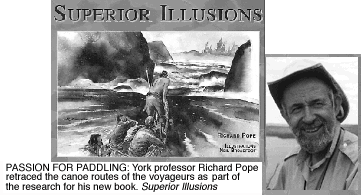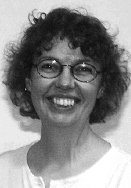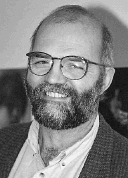
|

|
|
|
|
| | VOLUME 29, NUMBER 16 | WEDNESDAY, JANUARY 20, 1999 | ISSN 1199-5246 | | |
|
|
||
|
|
The Ford Foundation has awarded $1.4 million to Prof. Anne Bayefsky, director of the Centre for Refugee Studies at York, to conduct a review of the United Nations Human Rights Treaty System. The study is to be conducted directly in collaboration with the Office of the High Commissioner for Human Rights. During High Commissioner Mary Robinson's address at York University Nov. 24 - part of her first official visit to Canada - Robinson highlighted the importance of the study to her reform endeavours. The study, to be conducted with Prof. Christof Heyns from the University of Pretoria in South Africa, will take place over the next 18 months and will produce a report to the U.N. High Commissioner for Human Rights containing detailed recommendations for reform. The study has been launched in conjunction with the 50th Anniversary of the Universal Declaration of Human Rights. "While the legacy of the declaration was a commitment to the rule of law and the link between legal right and remedy, the international human rights system often provides little or no redress to real human rights victims," said Bayefsky. Canada is a major participant of the U.N. human rights treaty system, which includes six different treaties: civil and political rights; economic, social and cultural rights; racial discrimination; discrimination against women; children; and torture. Canada has accepted all six treaties, and Canadians actively participate in the regular U.N. reviews of Canada's human rights record. One of the treaty monitoring bodies, the Committee on Economic, Social and Cultural Rights, recently criticized Canada after Canadian non-governmental organizations made forceful presentations to the committee in Geneva. Canada also has the dubious distinction of being subject to more individual complaints to the monitoring body on civil and political rights - the Human Rights Committee - than any other state party to the complaints procedure. At its next session, in March 1999 in New York, the committee will take up the case of Arieh Waldman, who claims that Ontario's public funding of only Catholic denominational schools is a violation of non-discrimination rights in the U.N. civil and political rights treaty. The study comes at a time when the U.N. human rights treaty system is under mounting pressure to reform - from non-governmental organizations and governments alike. The treaty monitoring bodies are faced with more than 1,000 overdue reports from states on compliance with the treaties obligations. The backlog for the consideration of reports by the independent bodies stretches into years. The individual complaint processes are subject to serious difficulties, including the fact that despite widespread state acceptance of a right to complain, fewer than 100 cases a year are received from a potential complainant population of more than one billion people. Countries like Algeria or Chad have never been the subject of a single complaint. Prof. Bayefsky is the recipient of Canada's highest human rights research award, the Bora Laskin National Fellowship in Human Rights Research, and a MacArthur Foundation research and writing award for her work on the U.N. human rights treaties. She has participated in many Canadian delegations to the U.N. Human Rights Commission and General Assembly, and in Human Rights World Conferences in Vienna and Beijing. She also teaches international human rights at York University. | |
|
|
by Mary Ann Horgan Call him the last of the coureur de bois. Richard Pope, a professor in the Department of Languages, Literatures and Linguistics at York, has just written a book that recreates in vivid detail the path of Canada's early fur traders. But Pope did more than write about the voyageurs - he retraced the fur traders' routes after years of canoe trips, and he based his book on extensive historical research and firsthand paddling experience. Pope's book, Superior Illusions (Natural Heritage Books, 1998) is a fictionalized epic story with memorable characters and rich imagery. The book contains original, lavishly illustrated watercolours and black-and-white drawings by artist Neil Broadfoot, as well as maps based on originals by Jacques-Nicolas Bellin, a renowned early Canadian mapmaker. Many of the descriptions are taken from firsthand accounts out of historical fur trade journals in English and French. The book chronicles a voyageur route across what was then New France (Upper Canada). Superior Illusions is the culmination of six years of research and painstaking historical digging by Pope - to depict as accurately as possible the challenges and setbacks faced by Canada's earliest merchants. Paddling by canoe from Lachine, Quebec, to Grand Portage, Minnesota - the main trading route of the 1790s - the voyageurs in the story are constantly challenged by weather, waves and the maudits moustiques (damned blackflies). The protagonist in this gripping story is Dugald Macleod, a young Scot from the Isle of Skye. Dugald is related to North West Company owner Simon McTavish by marriage, and Dugald gets a job as a clerk with the company in Montreal. As the company's representative, Dugald travels with the voyageurs from Lachine, Quebec to Grand Portage up the Ottawa and Mattawa Rivers, across Nipissing, down the French River, across Lake Huron, through the Sault and across the treacherous Lake Superior. Dugald learns about the life of the voyageur the hard way. The book is full of authentic detail, with great geographical and historical information. The story is a fictional narrative told in epic verse form. It is interspersed with French Canadian songs and expressions used by the hearty voyageurs. "I've always loved canoeing and canoe trips, and Lake Superior has always had a special appeal," said Pope. "In 1985, I decided to tackle that lake with my canoe, and over the next four summers, I took paddling trips on Superior, which is very treacherous. It is really windy, with waves higher than the Atlantic, so on one out of every three days I had to wait out the wind." Following the paddling routes of the fur traders gave Pope new respect for the voyageurs. "The voyageurs were like hockey players," said Pope. "Once they hit their 30s, they were past their prime. It was a job for young men. The work was so arduous that their bodies could not handle it for too many years. After paddling those routes myself, I have a real appreciation of the strength and endurance of those men. " Every voyageur carried 180 pounds (81 kg) of weight on each trip. Each paddling trip lasted about 60 days. The men slept outside under their canoes, spent their days paddling shirtless, being baked by the summer sun and bitten by mosquitoes and blackflies at the height of the bug season (with no insect repellent to ward them off). "The voyageurs you see in early Canadian paintings are wearing bright beautiful shirts, looking clean-cut and shaven, as if they had just stepped out of a salon," said Pope. "Believe me, after 60 days in the great outdoors without even a tent for shelter, they didn't look that good." One of Pope's aims was to de-mythologize the lives of the voyageurs. "This book is different from many historical accounts because it does not romanticize their lives," said Pope. "My wife is a museum curator, so we really did strive for authenticity in the text and illustrations." When Pope and Broadfoot appear at a book launch, they dress in full voyageur costume and sing traditional French Canadian paddling songs. When he's not teaching Russian literature at York University, Pope has been spending his summers covering the voyageur routes. His fellow paddlers have included Broadfoot, an artist and art teacher, Hal Bowen, a retired teacher, and Archie Campbell, a Supreme Court justice from Toronto. A passion for canoes, adventure, and history compelled the group to retrace voyageur life. The book was launched at the Canadian Canoe Museum in Peterborough, Ont. in the fall, but Pope and Broadfoot have travelled to various official events to celebrate the release of Superior Illusions. He has been to Thunder Bay and North Bay, and recently in Toronto he appeared at the new Hudson's Bay Outfitters store in December and at Toronto's Indigo Books this month. Superior Illusions is available in the York Bookstore and around Toronto in better bookstores, or by calling the publisher, Natural Heritage Books, at (416) 694-7907 or toll-free 1-800-725-9982. |
|
|
|
There was much praise for new works of fiction, non-fiction, research and poetry that were launched at Glendon College recently. York's bilingual campus celebrated a host of new books authored, edited, and collaborated on by York professors. It was a gala event as the authors and supporters of York's francophone community gathered together to show praise for the publications. The launch was held in the Glendon Art Gallery. It was a formal event, with wonderful catered food and wine. About 50 people attended, and this intimate environment made for a positive night, reinforcing the importance and abundance of francophone literature and research texts. The evening was hosted by GREF (Groupe de recherche en études francophones) and organized by Prof. Alain Baudot and Glendon Principal Dyane Adam. The ceremonies were simple and sincere. There was reading from many of the authors from the books that had been published. GREF is an academic press that specializes in francophone publications. It was founded by Alain Badout and is based at Glendon. Another highlight of the evening occurred when Alain Baudot and Heljé Porré (Marshal of Glendon), honoured Dyane Adam, congratulating her on her new position as Canada's Commissioner of Official Languages. The House of Commons and the Senate granted her this position and she seemed very excited about it, though it will take her away from Glendon. When speaking with Adam about the importance of a night celebrating francophone literature at York she responded, "We get to honour our authors and the people at Glendon who have published." Regarding the importance of GREF, she said, "GREF supports our faculty and the community that we (Glendon) serve." Baudot showed the same excitement claiming "It goes without saying!" when asked what the meaning of the evening was, suggesting that honouring the francophone community is an exciting reason to come together. These books are accomplishments on many levels. They are products of our York faculty and they have taken much time to complete. They are representative of a flourishing francophone community in Ontario, with as strong base at York's bilingual campus. For these reasons alone, everyone affiliated with York has reason to celebrate and honour these new books. Nine of the new books were published by GREF and the other six are published by other Canadian based presses. The books celebrated are: BOOKS BY GREF
BOOKS BY OTHER PUBLISHERS
Jennifer Castle is an undergraduate student in the Department of English , Faculty of Arts.
|
|
|
|
by Don Evans "In terms of the crisis in the fishery and the many other environmental problems we face, what is clear is that modern society is getting more stupid by the minute." - Raymond Rogers Raymond Rogers, a commercial fisherman turned Faculty-of-Environmental-Studies (FES) professor, defines himself as "an optimist with a catastrophic sense of reality." It's a brand of optimism, he says, that's "informed by a recognition of disaster." Prof. Rogers recently celebrated the publication of Solving History: The Challenge of Environmental Activism by Black Rose Books. It's the final volume in his trilogy of books concerned with analyzing the failures of conservation. Solving History, the oxymoronic title, is "meant to be ironic," he says. "I'm tilting the oxymorons in the direction of hope." Rogers explains that his earlier books - Nature and the Crisis of Modernity and Oceans Are Emptying: Fish Wars and Sustainability - "looked at modernity and the deep historicity of the causes of environmental problems. "The defining aspect of modernity is the separation of politics and economics," he says. "There's all this buried politics in the economy. We can't solve environmental issues unless we regain access to that buried politics." Nature and the Crisis of Modernity shows how the "financialization of the globe" has set in motion a war on local culture and natural habitat. "As we are becoming increasingly diminished in social terms, we transfer authority over to the globalizing forces of privatization, deregulation and free trade," Rogers argues. "Less and less is being asked of us in an increasingly meaner world." Oceans Are Emptying analyzes the collapse of the global marine catch and the resulting international conflicts it has brought about, and argues for the necessity of implementing strong conservation measures. Of Solving History, Rogers says: "This is my solution book." He was "impelled by a sense of immediacy" in writing it, he says. "The people I care about are in jeopardy." A native of the farming community of Elgin, Manitoba, Rogers "retired" at the age of 24 to the south shore of Nova Scotia, halfway between Yarmouth and Halifax - where he took up commercial fishing for a living. He remained a fisherman for 12 years and returns to Nova Scotia every summer to serve on the last boat he built. "Fishing issues are still my main issues," he says. How did this East Coast Fisherman become a York academic? "I was here [in Southern Ontario], building million-buck houses in Markham and Newmarket to pay for my new, fibreglass boat after a bad fishing year," says Rogers. "My mate literally shoved me in the door here for an interview for the master's program [in environmental studies.]" Once accepted, Rogers took to academic life in earnest. He earned the first PhD in Canada in environmental studies at York in 1994, having completed the degree in 2-1/2 years. He "fished the whole time" while in the masters program and sold the boat when he began work toward the PhD. Now he is happy to say that he fits the "idiosyncratic openness" of FES. Still, his heart's in Nova Scotia. "If everyone who could see the ocean out of their window had a say in fishery policy," he says, "the fishery would be in a lot better shape than it is now." A fisherman-scholar who has "left community to study community," Rogers says that, "at the deepest level," his East Coast friends and neighbours are his "colleagues." In the same breath, he describes them as being "newly stupid." It is ecological collapse that has engendered his colleagues' collective stupidity, he explains. Whole communities of people who once earned their living from the sea have been forced by overexploitation of the resource to rely on government handouts and retraining in trades with little or no income potential. "Their failure is obvious ... [the failure of the rest of society] is not," he says. Rogers himself brings the point of view of the marginalized outsider to issues of environmental degradation and destruction. "Standard practice in the modern economy destroyed the fishery. If development is a good thing, how could this have happened? We need a deep critique of development. We must start to question the role of the market in [the destruction of natural wealth]," says Rogers. "From the perspective of the World Bank and the U.N., all conservation is development over the long term. But for radicals, conservation becomes a social issue linked with equity, peace and other social issues." From this radical, social perspective, development is seen as the marginalization of local people, he says. "The central argument of this book," Rogers writes in Solving History, "is that the 'seeming intractability' of environmental problems has to do with the inaccessibility of the forces which cause environmental problems. This inaccessibility has been created by the increasing privatization of political power in the economy, rendering the dynamics of appropriation and domination beyond the realm of public policy or democratic process. Those who benefit from the internalized political power in the economy do so in private terms, with no sense of public responsibility. In these terms, environmental policy is the public effort to address problems which have resulted from the private accumulation of wealth and power. "This abdication and amputation can be understood as a kind of 'double disappearance' where not only is the natural world disappearing in terms of species and habitat, but the human impetus to promote conservation because nature is part of 'us' is also disappearing. The fracture of 'us' is directly related to the 'phantom objectivity' of labour and resources - where humans and nature are the material upon which capital acts - that robs 'us' of any of the levers, either experientially or legally, which might begin to address environmental problems. "If this history is to be 'solved,' a challenge to the forces of capitalism is required. "We have turned over authority to insanity, to the Mike Harrises of the world, who are engaged in the massive transfer of public care to capitalism. It's insane as the basis for social relationships." Humankind finds itself in a game of musical chairs, says Rogers, with development playing the tune. "We're all sitting around while Harris plays the funeral dirge and ridiculous program titles like 'Lands for Life' mask the direness of it all." An excerpt from Solving History
| |
| | Current Issue | Previous Month | Past Issues | Rate Card | Contact Information | Search | |


